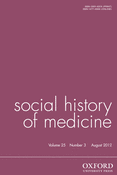-
Views
-
Cite
Cite
Christine D. Myers, Katharina Rowold, The Educated Woman: Minds, Bodies, and Women's Higher Education in Britain, Germany, and Spain, 1865–1914, Social History of Medicine, Volume 25, Issue 3, August 2012, Pages 746–747, https://doi.org/10.1093/shm/hks040
Close - Share Icon Share
Extract
In The Educated Woman: Minds, Bodies, and Women's Higher Education in Britain, Germany, and Spain, 1865–1914 Katharina Rowold provides in-depth analysis of the debates about whether women should be admitted to universities. The book is divided into three parts, one for each country, with the more familiar story of events in Britain presented first so it can provide a basis of comparison for Germany and Spain. Parallels are also drawn when appropriate with France, Russia, Switzerland and the United States, showing the exchange of ideas on women's position in society and the similar experiences of living in a post-Enlightenment, modernising state in the nineteenth century. Rowold provides ample background information on the political and social developments in each country to set the context for her readers, nevertheless those with a more thorough knowledge of the respective national histories will invariably get more out of the book.
Much emphasis in the debates studied by Rowold focused on the scientific views of the day. This was both because physicians often participated in the discourse and because there was a desire in some quarters to have female doctors and other medical practitioners to aid female patients. Although fears of overcrowding in the professions and a subsequent demand for professionalisation were often behind the opposition to women's higher education, Rowold rightly devotes her attention to the expression of ‘scientific’ reasons why women were told that, for their own good, they should not undertake university studies.




